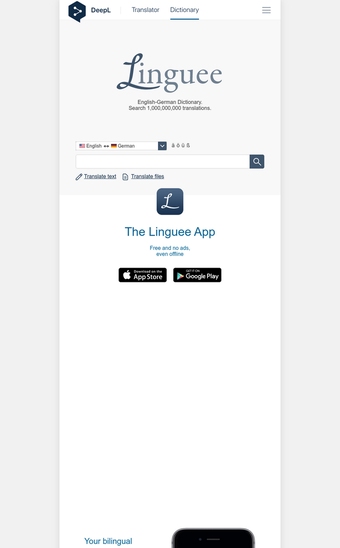Linguee
www.linguee.comLinguee is an online dictionary that offers translations across 25 languages, including Dutch, Swedish, Romanian, Latvian and Maltese. Unlike Google Translate, Linguee incorporates a search engine that provides access to huge amounts of bilingual sentence pairs taken from official websites, documents and reports to offer the most accurate suggestions.
A common problem when using a translation service such as those offered by Google or Bing is that it is difficult to know exactly how accurate the translation really is and whether the source they have taken it from its reliable. Therefore, a great feature that I feel makes Linguee the best tool for finding translations is the warning sign beside translations, alerting users that the translation taken from external source may be wrong. You can even click on the link to webpage it was taken from to check for yourself.
Another good aspect of the platform is the ability to download the app for free onto your phone and access its content offline. This means that if you are out and about and in need of a quick translation, you can continue using the app without incurring substantial data roaming charges. It also means you can practice your language skills when on the underground or on a plane, by accessing tools such as ‘Pronounce’ to discover how to say words in a native accent.
Paradoxically, both the main advantage and disadvantage of using Linguee as a translation tool is the same. That is, if you are looking to translate paragraphs of text or find out what a friend’s colloquial text message is saying, you won’t be able to due to the limitation that means the platform will only offer suggestions taken from published sources. The flipside to that is that it means when you do find a translation, you know that it is almost certainly reliable.
Linguee is an online dictionary that offers translations across 25 languages, including Dutch, Swedish, Romanian, Latvian and Maltese. Unlike Google Translate, Linguee incorporates a search engine that provides access to huge amounts of bilingual sentence pairs taken from official websites, documents and reports to offer the most accurate suggestions.
A common problem when using a translation service such as those offered by Google or Bing is that it is difficult to know exactly how accurate the translation really is and whether the source they have taken it from its reliable. Therefore, a great feature that I feel makes Linguee the best tool for finding translations is the warning sign beside translations, alerting users that the translation taken from external source may be wrong. You can even click on the link to webpage it was taken from to check for yourself.
Another good aspect of the platform is the ability to download the app for free onto your phone and access its content offline. This means that if you are out and about and in need of a quick translation, you can continue using the app without incurring substantial data roaming charges. It also means you can practice your language skills when on the underground or on a plane, by accessing tools such as ‘Pronounce’ to discover how to say words in a native accent.
Paradoxically, both the main advantage and disadvantage of using Linguee as a translation tool is the same. That is, if you are looking to translate paragraphs of text or find out what a friend’s colloquial text message is saying, you won’t be able to due to the limitation that means the platform will only offer suggestions taken from published sources. The flipside to that is that it means when you do find a translation, you know that it is almost certainly reliable.






